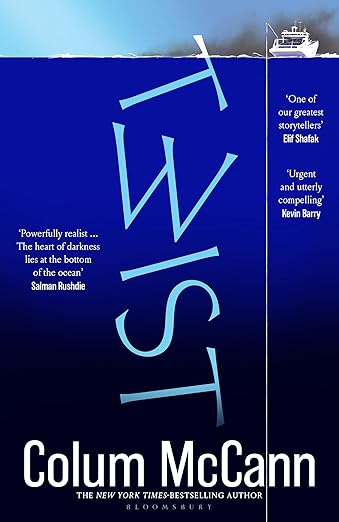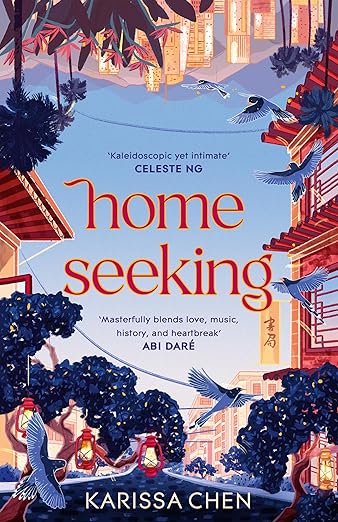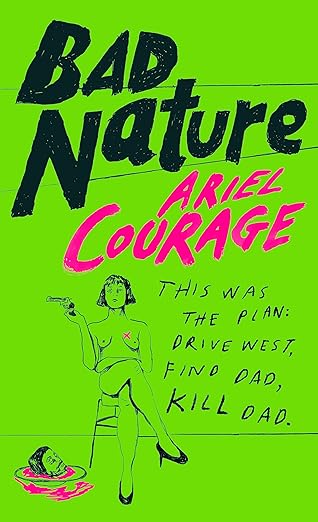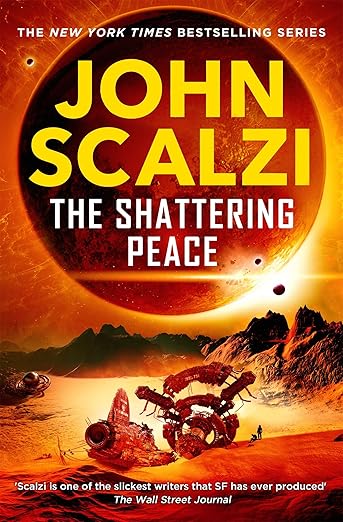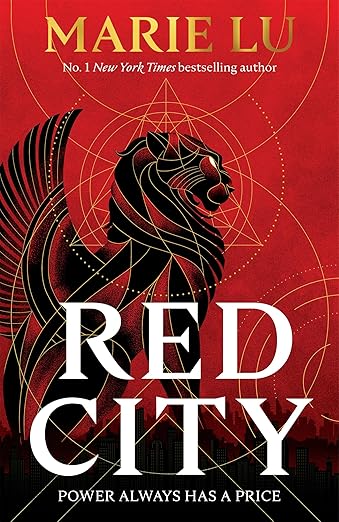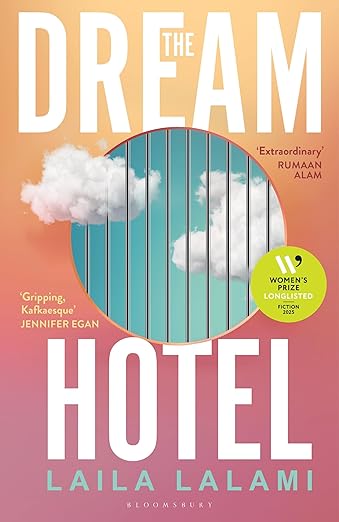A big hello and thank you for reading! Passionate about literature, psychology, and life I launched Book Therapy as an alternative form of therapy using the power of literature. I train mental health professionals, librarians, teachers as well as readers on using bibliotherapy in their own work through our online Bibliotherapy, Literature and Mental Health course. We also curate reading lists/personalised book prescriptions for clients based on their individual needs. This is our signature personalised reading service.
40 Books from 2025 You Need to Read in 2026
Posted by Bijal Shah on
Best Literary Fiction Book of 2025
1. Twist (Novel) by Colum McCann
In Twist, Colum McCann turns the invisible arteries of our digital world—undersea fibre-optic cables—into a startling metaphor for human connection and fracture. Following journalist Anthony Fennell aboard a deep-sea repair ship off the West African coast, McCann fuses reportage with lyrical fiction to explore how we connect, break, and try to mend both technology and ourselves. The novel’s trio—Fennell, engineer-diver John Conway, and actress Zanele—are bound by loss and longing as they descend deeper into the ocean and their own emotional depths. McCann’s prose is taut and shimmering, filled with lines that cut to the bone: “Everything gets fixed and we all stay broken.” Both an adventure and a meditation, Twist captures the pulse of our wired, weary age—where repair is always partial, and connection never quite complete. It’s one of 2025’s most resonant works of literary fiction: ambitious, timely, and quietly devastating.
2. Homeseeking (Novel) by Karissa Chen
In Homeseeking, Karissa Chen weaves a sweeping and deeply intimate saga that follows childhood sweethearts Suchi and Haiwen across six decades, four nations and the upheavals of modern Chinese history. Their story begins in 1930s-’40s Shanghai, where music and dreams bind them, but war, displacement and duty tear them apart. As Suchi emigrates to Hong Kong and the U.S., and Haiwen follows a very different path through Taiwan and eventually Los Angeles, the novel becomes a moving meditation on home, identity and the ghosts of what might have been. With parallel timelines and shifting perspectives, Chen uses their separate lives to reflect the larger currents of migration, memory and survival. The prose is luminous yet grounded, the characters both shaped by and resisting history. Homeseeking doesn’t just tell a love story—it probes what it means to belong, to carry loss, and to find a place in a world always in motion. It is a debut of remarkable scope, heart and ambition.
3. Bad Nature (Novel) by Ariel Courage
In Bad Nature, Ariel Courage delivers a gritty, darkly comic debut that begins with a startling premise: on her 40th birthday, corporate lawyer Hester receives a terminal cancer diagnosis and embarks on a driven road trip across America with one goal in mind—kill her estranged father. As her plan unspools, she picks up John, a passionate young environmental activist, and together they traverse landscapes of both physical decay and moral collapse, from luxury hotels to toxic Superfund sites. The novel cleverly mirrors Hester’s personal anger, alienation and desire for vengeance with the country’s environmental and social failures, making the journey as much about systemic damage as it is about one woman’s trauma. Courage’s prose is crisp, sharp and unsettling, with a narrator whose detachment and cynicism are equally compelling and repulsive. Bad Nature is part road trip, part revenge thriller, part ecological lament — and it refuses easy resolutions while still offering glimpses of connection and change. This audacious debut stakes its claim as one of 2025’s most distinctive voices in literary fiction: bold, unflinching, and hauntingly resonant.
Best Science Fiction & Fantasy Books of 2025
4. The Shattering Peace (Novel) by John Scalzi
In The Shattering Peace, Scalzi returns to his beloved Old Man’s War universe with energy and precision, delivering a smart, fast-moving space opera that balances big-idea speculation with crackling dialogue. Set ten years after the events of The End of All Things, the novel begins with an uneasy peace between humanity (via the Colonial Union), Earth and the alien Conclave — but all is far from stable. When a secret joint‐colony of humans and aliens vanishes without a trace, mid-level diplomat Gretchen Trujillo is drawn into investigating the advanced and inscrutable Consu, whose own civil war now threatens the entire galaxy. Scalzi keeps the stakes high while remaining readable and sharp-witted; there’s enough background to welcome new readers, yet loyal fans will recognise the deeper resonances in the series. With its blend of diplomacy, action and alien philosophy, the book explores how fragile peace can be and how easily seemingly stable orders can unravel under the weight of superiority, mistrust and hidden agendas. For readers looking for science fiction that entertains, engages and reflects real-world concerns about power, alliances and identity under pressure, The Shattering Peace makes for a compelling pick.
5. Red City (Novel) by Marie Lu
In Red City, Marie Lu delivers a sleek, high-stakes adult debut that blends urban fantasy with crime drama in a dazzling alternate version of Los Angeles. At the heart of the story are two childhood friends — Sam, the daughter of a struggling single mother, and Ari, a gifted boy plucked into privilege — who discover they both carry the hidden power of alchemy and are drawn into competing syndicates: Grand Central and Lumines. These rival crime organisations control the city’s elite through “sand,” a magical drug derived from alchemy that grants enhanced beauty, charisma and power. Caught between their loyalties, their ambitions and their complicated past connection, Sam and Ari navigate a world where trust is fragile and the cost of perfection is devastating. Lu’s alternate Angel City is both glamorous and brutal, each magic-fueled confrontation reflecting deeper questions about class, identity and the illusions of self-improvement. With its pace, intrigue and moral complexity, Red City is as much a love story of fractured friends as it is a war tale of power, identity and survival. It’s a sumptuous, seductive read — one that asks: how far will you go to become more than you were, and what will you lose in the process?
6. The Dream Hotel (Novel) by Laila Lalami
In The Dream Hotel, Lalami crafts a chilling near-future thriller where even our dreams are no longer private and freedom becomes a haunting question. Museum archivist Sara Hussein returns from a work conference only to be pulled aside by agents of the Risk Assessment Administration (RAA), who inform her that an algorithm analysing her dreams has flagged her as a potential future criminal and she must be placed under observation. She is confined in a retention centre alongside other “dreamers,” where the rules shift daily and even the slightest deviation can extend her stay indefinitely. Through this eerie setup, Lalami explores surveillance, algorithmic bias, identity and the precariousness of justice in a society that trades privacy for security. The prose is taut and unnerving, the scenario disturbingly plausible. The novel’s tension comes not just from Sara’s fight for autonomy but from how easily an individual can be subsumed by systems that claim objectivity but carry embedded prejudice.
Best Business and Leadership Books of 2025
The authors argue that rather than viewing artificial intelligence primarily as a threat, society should embrace it as a powerful amplifier of human agency — enabling people to do more, think bigger and access tools that were once reserved for elites. They use historical examples of previous technological revolutions (like the printing press and electricity) to illustrate how society feared change but ultimately benefited, suggesting AI could follow a similar arc. Central to the book is the idea of a “techno‑humanist compass”: that our design, governance and deployment of AI should be guided by human values and a desire to increase freedom and agency, not diminish it. Practical scenarios are offered: AI tutors tailoring education to every student, researchers accelerating cures for diseases, everyday people using AI assistants to navigate complex life systems. The authors also acknowledge real risks — job displacement, bias, disinformation — but argue that the overriding narrative should shift from fear to proactive shaping of the future. They advocate for “adaptive governance” rather than rigid regulation: systems that evolve with the technology rather than stifle it. Ultimately, Superagency presents AI not as a substitute for human thought but as a partner — one that, when properly shaped, can unlock a future where more people have more power to act, create, and make meaningful change.
8.
In Making It Big, Femi Otedola offers a compelling blend of memoir and business manual that tracks his rise from modest beginnings in Lagos to becoming one of Africa’s most influential entrepreneurs. Released in August 2025, the book details his early ventures into oil and gas, his transformation of companies like Forte Oil and Geregu Power, and the formidable setbacks he faced—losses that threatened his empire and required strategic reinvention. The narrative is candid: Otedola doesn’t shy away from the risks, the debt, the currency‑crises and the shifting regulation that typify doing business in Nigeria. What sets the book apart is its dual focus—not just on achieving wealth, but on building a legacy: through philanthropy, education, and giving back to the continent. The lessons are practical and global: how to spot opportunity, how to pivot when momentum falters, how leadership in unstable markets demands agility and moral clarity. Endorsed by figures like Ngozi Okonjo‑Iweala and Aliko Dangote as a “must‑read” for aspiring entrepreneurs, Making It Big positions itself as more than an autobiography—it’s a blueprint for business leaders in emerging markets. For the 2025 reader interested in leadership, resilience, and the interplay between enterprise and purpose, this is a textured, energising and uncommonly transparent read.
9. The Seven Rules of Trust: Why It Is Today's Most Essential Superpower (Non-fiction) by Jimmy Wales

In The Seven Rules of Trust, Jimmy Wales draws on his experience founding Wikipedia—a global platform dependent on people trusting strangers online—to present a powerful blueprint for rebuilding trust in business, leadership and society. He argues that trust isn’t a static asset but a dynamic “living thing” that must be cultivated, protected and renewed. Rules—such as “Make It Personal”, “Be Civil”, “Be Transparent”, and others—that form the backbone of his thesis about creating lasting systems of trust. Wales highlights how Wikipedia’s early adoption of principles like assuming good faith, open accountability, and transparent governance served as the foundation for a community that now sees billions of page‐views monthly. Against the backdrop of widespread institutional mistrust—from media to corporations to governments—Wales presents this as one of the most essential “superpowers” for leadership and organisational resilience in our era. With practical anecdotes, thoughtful reflection and clear rules, the book is both hopeful and hands‐on—offering something immediate for anyone looking to lead, build culture or restore credibility in chaotic times.
Best Young Adults Books of 2025
10. Katabasis (Novel) by R. F. Kuang
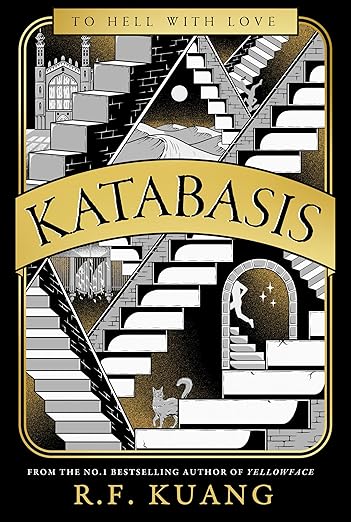
Set in the elite halls of Cambridge’s fictional Department of Analytic Magick, Katabasis follows doctoral student Alice Law as she descends into Hell to rescue her late advisor. Joined reluctantly by her rival Peter Murdoch, Alice navigates eight infernal circles that mirror the brutal realities of academia—ruthless competition, bureaucratic despair, and obsession with reputation. As they confront magical, paradoxical challenges, both characters are forced to examine ambition, identity, and the costs of pursuing excellence. Blending dark fantasy, high‑concept magic, and satirical academic critique, the novel explores how far one will go for validation, achievement, and self‑discovery.
11. Atmosphere (Novel) by Taylor Jenkins Reid
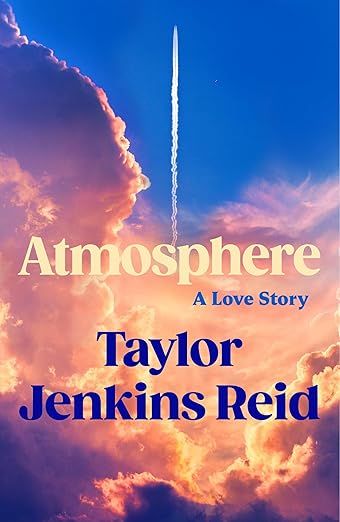
In the summer of 1980, astrophysicist Joan Goodwin—once content teaching at Rice University—spots an advertisement that changes everything: a call for women scientists to join the NASA Space Shuttle program. Selected from thousands, she begins rigorous training at Houston’s Johnson Space Center alongside a diverse cohort: Top Gun pilot Hank Redmond, engineer Vanessa Ford, scientist John Griffin, mission-specialist Lydia Danes and warm-hearted Donna Fitzgerald. As these unlikely friends prepare for their first flights, Joan discovers not only the thrill of space but also an unexpected love in Vanessa—a love that shifts her sense of identity and place in the universe. Under the glare of 1980s sexism and the weight of ambition, Joan questions everything she believes about her work, her family (especially her niece Frances) and what it means to reach for something bigger than herself. Then, in December 1984, aboard mission STS-LR9, everything changes in an instant: the mission’s shocking turn forces Joan—and all involved—to confront the fragility of life, love and the atmosphere that holds us together. At its heart, the novel is about yearning, sacrifice, and how the invisible “atmosphere” of connection between people can be as vital as oxygen in space.
12. Onyx Storm (Novel) by Rebecca Yarros
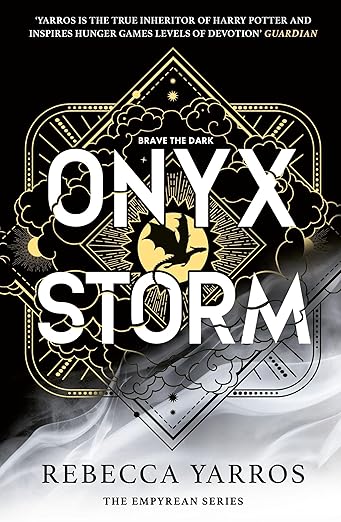
In Onyx Storm, the third installment of the Empyrean series, Violet Sorrengail’s journey takes a darker, more desperate turn as she steps beyond the academy’s walls and into a war-ravaged world where dragons, magic and politics collide. No longer a novice, Violet must now navigate shifting alliances among kingdoms, ancient prophecies and the threat of the venin—magic-wielding enemies whose rise signals the end of the status quo. Alongside her dragon Andarna, Violet seeks the seventh breed of dragon, pursues answers about hidden powers, and confronts the toll of war on her friends, her mentor, and the man she loves. The stakes are personal and epic: betrayal touches her closest companions, the magic system expands with dangerous second signets, and the world’s foundation trembles under a storm that might consume everyone. The novel balances high-octane battles and political maneuvering with emotional weight—trauma, loyalty, choice and sacrifice all here charge the narrative. And while the romance between Violet and Xaden remains central, it’s the outer threats and inner shifts that drive Onyx Storm into both thrilling and haunting territory. The ending leaves readers on a cliffhanger, the tempest still raging, setting the stage for the next chapter in the saga.
13. Witchcraft for Wayward Girls (Novel) by Grady Hendrix
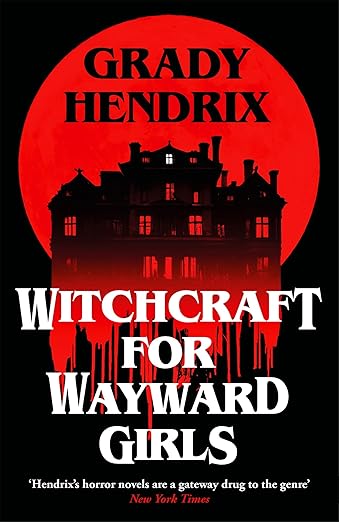
In Witchcraft for Wayward Girls, Hendrix transports readers to the sweltering summer of 1970 in Florida, where fifteen-year-old Neva Craven is sent to the remote “Wellwood House” — a maternity home for unwed mothers — renamed “Fern” and stripped of her identity and autonomy. Inside the home, Fern meets other girls in similar plight — Rose, Zinnia, Holly — all living under the strict control of adults who dictate their bodies, their movements, and their futures. When a traveling library van arrives and Fern is handed a book titled How to Be a Groovy Witch, the girls begin experimenting with witchcraft, discovering a sliver of power in a place built to deny them any. But magic comes with a cost — as the girls learn, the price of reclaiming agency in a confining system is high, and the horror isn’t just supernatural: it’s embedded in the historical injustice, the bodily horror of forced pregnancies, and the silencing of young women. With Hendrix’s characteristic blend of folk horror, feminist bite and historical weight, Witchcraft for Wayward Girls sears its way into memory: it’s as much a reckoning with systemic oppression as it is a chilling, haunting ride.
14. The Bones Beneath My Skin (Novel) by T. J. Klune
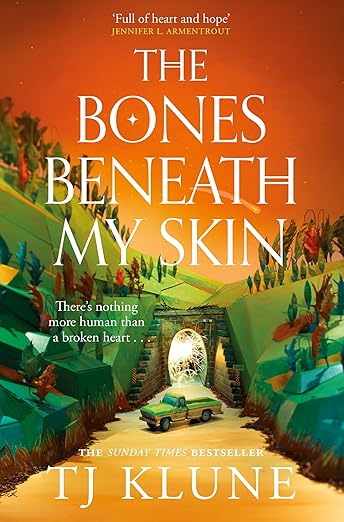
In the spring of 1995, journalist Nate Cartwright has lost everything—his parents are dead, his brother has disowned him, and he’s been fired from his job in Washington, D.C. Seeking refuge, he retreats to his family’s summer cabin in the Oregon woods. Instead of solitude, he finds the cabin already occupied by a brooding ex-Marine named Alex Weir and a ten-year-old girl who calls herself Artemis Darth Vader—and who is far more mysterious and powerful than she first appears. Together, the three are thrust into a perilous road-trip adventure: cultists, government agents and cosmic forces are closing in as Artemis’s fate and identity become central to the survival of them all. As Nate fights his own grief and disillusionment, he begins to form unexpected bonds—with Alex, with Artemis, and with the possibility of a future he thought he’d never have. The narrative weaves big-idea sci-fi thrills, found-family warmth, and emotional healing. In the end, the novel asks: what does it mean to be human, to be whole again, and what are we willing to fight for?
15. The Three Lives of Cate Kay (Novel) by Kate Fagan

Bestselling author Cate Kay has captivated millions with her book trilogy and the blockbuster film adaptation—but no one knows who she really is. In truth, she was born Annie Callahan in upstate New York, later reinvented herself as Cass Ford while working a coffee shop and living out of her car after one tragic night changed everything.
She carried her secret through identity changes, fame, love and betrayal, hiding behind a persona as her career soared and her relationships fractured. As Cate prepares to publish her “‘memoir’” and lay bare her story, she must grapple with the cost of ambition, the toll of reinventing herself, and whether returning home is a path toward redemption.
The novel weaves together themes of friendship, identity, fame and the stories we tell ourselves—and others—about who we are.
Best LGBTQIA+ Books of 2025
16. The Sunflower Boys (Novel) by Sam Wachman

Twelve-year-old Artem lives in the Ukrainian city of Chernihiv, spending his days helping on his grandfather’s sunflower farm, drawing in his sketchbook (a gift from his father far away in America), and swimming in the river with his younger brother Yuri. Artem also quietly grapples with his growing romantic feelings for his best friend Viktor—an inner struggle made more urgent by a society where such feelings must stay hidden. Then on a February night, war erupts: Russian forces invade, destroying Artem’s home, killing his mother and grandfather, and leaving the two brothers to flee. Artem and Yuri embark on a harrowing journey across war-torn Ukraine, carrying little more than their backpacks, Artem’s sketchbook, and each other, as they strive to reunite with their father and find safety. Through the journey, Artem must protect Yuri, process grief and loss, and face questions of identity, belonging and survival under the most brutal of conditions. Ultimately the novel is a coming-of-age story interwoven with queer love, sibling loyalty, and the spirit of Ukraine in wartime—a powerful, heartbreaking portrayal of how war can uproot everything, yet also how art, memory and love persist.
17. We Do Not Part (Novel) by Han Kang
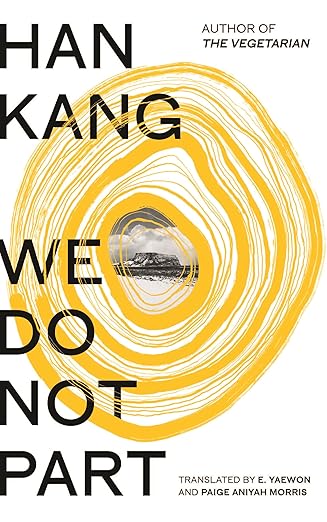
Kyungha, a writer in Seoul suffering from insomnia and haunting migraines, receives an urgent message from her old friend Inseon to fly to Jeju Island and care for her bird, Ama, after Inseon’s accident. On arriving during a snowstorm, Kyungha finds herself plunged into a surreal white world, where reality warps and a long‑buried family archive begins to surface. The woods around Inseon’s house hold memories of the unspeakable: Inseon’s mother’s siblings were victims of the 1948–49 cover‑up massacre on Jeju, and the land itself seems to bear the bones of the past. Through dreams, broken documents and the slow unraveling of history, Kyungha and Inseon’s friendship becomes entwined with the ghosts of violence, loss and forgetting. Snow, trees, a bird, an archive of pain: these motifs recur as Kyungha confronts the question “Can the past help the present? Can the dead save the living?” Ultimately the novel is both a hymn to friendship and an indictment against forgetting—an exploration of how individual lives, memory and historical trauma intertwine in the silent crevices of a winter landscape.
18. The Emperor of Gladness (Novel) by Ocean Vuong
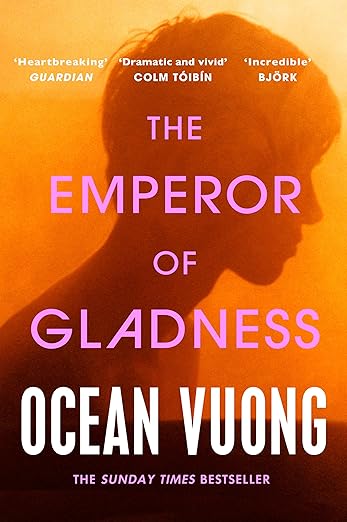
Nineteen‑year‑old Hai stands on the edge of a bridge in the rusting, post‑industrial town of East Gladness, Connecticut, ready to end his life. Instead, he hears a voice—an elderly Lithuanian widow named Grazina, afflicted with dementia—who stops him and offers him a different path.
Hai becomes Grazina’s caretaker, moving into her home and taking a job at the local diner to survive. Over the next year they build an unlikely, tender bond—between youth and age, immigrant and domestic, addiction and memory. The novel follows their lives and the other marginal figures working in the diner: people scraping by, carrying hidden burdens, connected by loneliness, labor and survival.
Through Hai’s struggle with addiction, immigrant family history, and the ghost‑echoes of war, and Grazina’s unraveling dementia tied to her own survival of conflict, the book explores how we tell ourselves stories to stay alive—how love, labor, loss and memory intersect in the lives of those on society’s edge.
At its heart, The Emperor of Gladness asks what it means to live “only once,” and how the smallest acts of connection—a shared meal, a quiet promise, a job done in dim light—can become our second chances.
My favourite quote: "Because to remember is to fill the present with the past, which meant that the cost of remembering anything, anything at all, is life itself. We murder ourselves, he thought, by remembering."
Best Psychology Books of 2025
19. Ordinary Magic: The Science of How We Can Achieve Big Change with Small Acts (Non-fiction) by Gregory Walton

In Ordinary Magic, social psychologist Greg Walton reveals how deceptively small shifts in mindset can produce profound changes in our lives. He argues that the big questions we all face — “Do I belong?”, “Can I succeed?”, “Am I loved?” — often stem from ordinary situations, and that by recognizing and responding to these moments with clarity, we can unlock what he calls “ordinary magic.” Through engaging stories and psychological research, the book shows how small acts — a single “choice word” from a parent or teacher, a brief moment of reflective pause before a conversation — can create new trajectories for behavior and identity. Readers learn practical strategies for noticing the questions that hold them back, confronting them with empathy, and shifting their responses toward possibility and growth. Ultimately, Ordinary Magic promises that change isn’t reserved for the few: when we understand how to work with the everyday, we can transform our relationships, our learning, our sense of self — and mesh the ordinary with the extraordinary.
(Non-fiction) by Dr Rami Kaminski
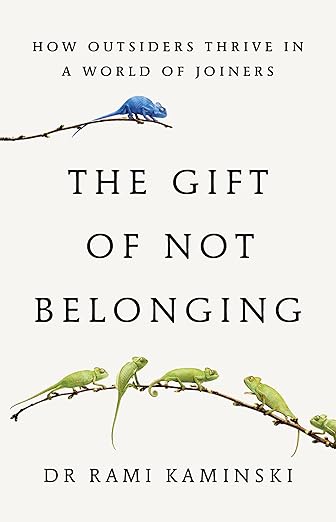
In this book, psychiatrist Rami Kaminski introduces the personality style he calls the “otrovert”—someone who never quite feels at home in any group, regardless of whether they’re popular or socially engaged. He argues that in a culture which prizes belonging—to families, teams, communities—otroverts often feel misunderstood, but in fact their sense of non‑belonging can be a strength rather than a flaw. The book explores how otroverts can flourish by embracing their independence, deep one‑on‑one relationships, and the freedom from needing group approval. Through case studies, psychological insight and cultural commentary, Kaminski shows how outsiders often observe more clearly, resist groupthink, and contribute unique perspectives. Ultimately the book is both a validation for people who’ve felt like they never fitted in and a guide for leveraging that difference — turning non‑belonging into its own kind of belonging.
21. Life in Three Dimensions (Psychology Non-fiction) by Shigehiro Oishi

In Life in Three Dimensions, Oishi challenges two deeply-ingrained assumptions about how to live well: that a good life is about happiness, or that it’s about meaning. While both have been staples of psychological research, he argues that each has its limits — happiness can lead to complacency, and meaning can become narrow and constraining.
Instead, Oishi proposes a third dimension: psychological richness. This concept emphasises curiosity, variety of experiences, perspective shifts, and embracing uncertainty — from small acts like changing your route home, to major life changes like moving to a new country.
Drawing on his own life (raised in a small Japanese town, later becoming a psychologist) and weaving in case studies—from ordinary people to luminaries such as Steve Jobs and Oliver Sacks—Oishi shows how embracing challenge, surprise and exploration can lead to a fuller, more authentic existence.
With a clear, accessible style, the book invites readers not just to ask “What makes me happy?” or “What is my purpose?” but “How many rich experiences can I pack into life?” In doing so, it offers practical suggestions for cultivating psychological richness and living with more depth, flexibility and resilience.
22. Trust Your Mind: Embracing Nuance in a World of Self-Silencing (Psychology Non-fiction) by Jenara Nerenberg

Trust Your Mind tackles one of the most pressing issues of our era: the increasing phenomenon of self-silencing in a hyper-connected society. Rather than focusing merely on overt censorship, Nerenberg examines how individuals internalise the pressure to conform, limit their expression, and mute their voices to avoid backlash, exclusion or conflict.
Built on her background in journalism, psychology and public health, Nerenberg explores how groupthink, fear of dissent, and the shrinking of conversational space are affecting not only public discourse but personal wellbeing. From campuses and workplaces to social media and families, the book lays bare how the shrinking 'safe' zone of expression influences identity, creativity, isolation and mental health.'
Importantly, Trust Your Mind is not merely diagnostic—it offers a hopeful path forward. Nerenberg provides tools and frameworks for recognising when one is silencing themselves, how to reclaim one’s voice consciously and empathetically, and how to engage in authentic communication that fosters connection rather than polarisation.
In essence, the book is a call to trust one’s mind—its doubts, impulses and dissent—and to navigate a world where speaking up and listening both require courage. It invites readers to rediscover nuance, humility and curiosity in their inner and outer dialogues.
23. Healing the Modern Brain (Psychology Non-fiction) by Dr Drew Ramsey
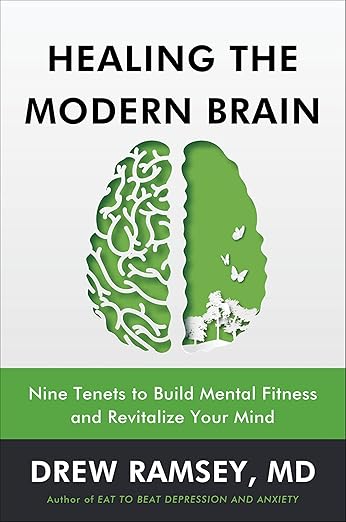
In this compelling guide, psychiatrist Dr Drew Ramsey argues that our modern world—with its stress, screens, isolation and ever-expanding demands—has created a mental-health landscape in which many of us feel “off” even without a formal diagnosis. He proposes a proactive framework called Mental Fitness—not simply treating mental illness when it arises, but building habits and skills to keep our brains resilient, adaptable and thriving.
Across the book, Ramsey outlines nine core tenets—drawn from neuroscience, epigenetics, nutrition, movement, connection and mindset—that can help anyone cultivate brain health beyond crisis moments. He blends clinical case studies from his practice with accessible science, showing how lifestyle (diet, sleep, relationships) and environment (screen time, sedentary behaviour, social fragmentation) directly affect brain structure, mood and cognition.
Ultimately, the book invites readers to stop looking for a “magic pill” and instead embrace a holistic, active approach: a brain that thrives through consistent practices, not just reactive treatments. It is a timely call to re-imagine mental health as fitness.
24. A Trick of the Mind: How the Brain Invents Reality (Psychology Non-fiction) by Dr Daniel Yon

In A Trick of the Mind, cognitive neuroscientist Dr Daniel Yon explores one of the most provocative ideas in contemporary psychology: that our brains don’t merely receive reality, they construct it. Drawing on decades of research—including his own work at the Uncertainty Lab at Birkbeck—Yon argues that the brain is essentially a “skull-bound scientist”, constantly building models of the world, updating them when new evidence arrives, and sometimes clinging to outdated or distorted models when uncertainty arises.
He shows how this process of prediction and revision spans from everyday perception (why we “see” what we expect) to complex phenomena like belief, identity and mental illness. For example: when expectations strongly dominate, the brain may ignore contrary sensory input—leading to hallucinations, conspiracy theories or distorted self-views.
The book blends engaging storytelling—ranging from medieval mystics and sports coaches to modern psychosis research—with rigorous science, making the case that understanding how our brain constructs reality can help us better understand others, shift our beliefs and improve mental health.
Best Translated Books of 2025
25. Heart Lamp: Selected Stories (Short Stories Collection) by Banu Mushtaq (trans. Deepa Bhasthi)
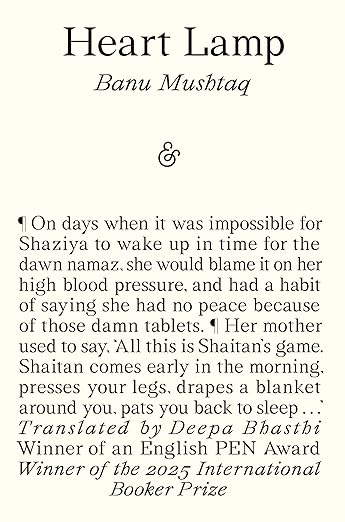
A collection of twelve tightly-wound stories drawn from decades of writing, set in southern India and centred on Muslim and Dalit women navigating faith, caste, desire, loss and resistance,
The characters are grounded in everyday life — marriage, the watch-shop, motherhood, domestic risk — yet the tone often carries a quiet urgency: how to live and speak beneath pressure. What unites them is the “heart lamp” of inner life: memory, longing, agency in the margin.
26. On the Calculation of Volume I (Novel) by Solvej Balle (trans. Barbara J. Haveland)
A novel of dislocation, time-loops and the uncanny, in which a woman named Tara Selter finds herself slipping out of time — the book describes how “one woman’s fall through the cracks of time” unfolds. The tone is poetic and fragmented: ordinary domestic moments are repeated, yet each loop brings change; there’s a sense that existence is hinged on the improbable.
It plays with form, memory and the experience of being unsettled in one’s self.
27. We Are Green and Trembling by Gabriela Cabezón Cámara (Novel) (trans. Robin Myers)

Based on the historical figure of the Lieutenant Nun, this novel follows Antonio (born a girl, disguised as a boy) during the Spanish conquest of the Americas; now hiding in the jungle with two Guaraní girls he rescued from enslavement.It is a re-imagining of colonial history, gender transformation, and the wild, luminous space of the rainforest as a place of metamorphosis.
The writing is baroque and surreal, weaving Latin prayers, Guaraní language, and rebel myths into a confrontation with conquest and identity.
28. Hunchback (Novel) by Saou Ichikawa (trans. Polly Barton)
Shaka Isawa, born with a congenital muscle disorder, lives in a care home outside Tokyo; her life may be physically constrained, but online she studies, tweets, writes erotica — until a new male carer reveals he has read it all, and Shaka responds with an unexpected proposal.
The narrative is unflinching and darkly comic, dealing with disability, desire, autonomy and the boundaries of life centered “at humanity’s edge.” With razor-sharp voice and subversive energy, the novel dissects assumptions about body, agency and the self.
29. Perfection by Vincenzo Latronico (trans. Sophie Hughes)

Set in Berlin and Lisbon, this novel follows Tom and Anna amid the shifting tides of globalisation, gentrification and social performativity — as the world remodels around them, their intimate lives feel the pressure of “perfection” becoming ever more remote.
The book is a faint satire of the expat dream, exploring how alienation grows when authenticity is replaced by curated identity. Its tone is crisp, observant and incisively aware of the creeping hollow of aestheticism.
Best Sports Book of 2025
30. Shot Ready (Memoir-Guide) by Stephen Curry
In this visually rich memoir-guide, NBA superstar Stephen Curry shares the philosophy behind his dominance on the court—and beyond. With over 100 photographs, he opens up about his mindset of preparation, continuous improvement, creativity, joyful discipline and mindfulness. Rather than simply recounting highlights, Curry invites readers into the “work behind the scenes,” showing how his habits, values and connection to community fuel his success—and how they can inspire anyone’s journey.
31. Peak: The New Science of Athletic Performance That Is Revolutionizing Sports (Non-fiction) by Marc Bubbs

A deep dive into the latest scientific research on sport performance, health, training, recovery and mindset. Rather than simply recount stories of athletes, Bubbs pulls together academic, physiological and nutritional insights to create a blueprint for how both elite and everyday athletes can reach new levels.
32. Capturing Kahanamoku: How a Surfing Legend and a Scientific Obsession Redefined Race and Culture (Non-fiction) by Michael Rossi

This book tells the story of Duke Kahanamoku, Hawaiian surfing icon, and pairs his life and legacy with a modern scientific and cultural investigation of surfing, race, identity and oceanic culture. It expands the typical “sports biography” into a culturally rich narrative about sport as meaning.
Best Travel Books of 2025
33. In Green: Two Horses, Two Strangers, a Journey to the End of the Land (Travel Non-fiction) by Louis D. Hall

Two strangers, two horses, one extraordinary journey. Setting out from Italy’s Apennine mountains, Hall and his companion ride westward across Europe to Spain’s Cape Finisterre—the “end of the land.” As landscapes shift from olive groves to wild coastlines, their fragile partnership is tested by exhaustion, weather, and the limits of endurance. Lyrical and meditative, In Green is an ode to slowness, nature, and human connection—a modern pilgrimage through geography and the soul.
34.The New Tourist: Waking Up to the Power and Perils of Travel (Travel Memoir) by Paige McClanahan

A sharp, global-looking book that examines how travel and tourism shape places and people. Through dispatches from destinations like Hawaii, Saudi Arabia and Angkor Wat, McClanahan asks how tourists impact local cultures, economies and environments — and argues for a more mindful “new tourist”.
36. Istanbul: A City of The World’s Desire
A photo‑rich travel experience book, it invites you into the heart of Istanbul through hundreds of high‑resolution images capturing the city’s layered identity—from Ottoman palaces to modern life bridging Europe and Asia. Minimal text allows the imagery to speak, making it as much visual art as travel narrative.
37. The Last American Road Trip (Travel Memoir) by Sarah Kendzior
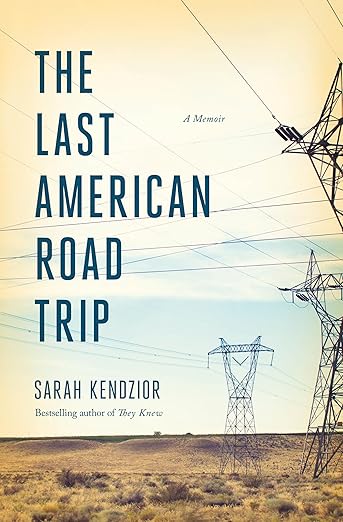
Journalist Sarah Kendzior takes to America’s highways with her husband and children in tow, determined to show them the country she loves even as it strains under political, environmental and social upheaval.
The family’s road trips span from Missouri outward, through national parks, Route 66, historical landmarks and forgotten American corners, while Kendzior confronts rising autocracy, the pandemic’s upheaval, and the shape of “home” in deeply divided times.
Part memoir, part travelogue and part political history, the book is a promise to her children that the America they inherit will be worth knowing—even while Kendzior struggles to believe it herself.
Best Food & Cook Books of 2025
38. Third Culture Cooking(Cookbook) by Zaynab Issa

This debut cookbook blends the author’s East African and South Asian heritage with her American upbringing. It features recipes like French onion ramen, tandoori tacos and baklava granola. It’s not just about recipes—it guides cooks on hosting, pantry essentials and “eating with your eyes.”
39. Good Things: Recipes to Share with People You Love (Cook Book) by Samin Nasrat

In Good Things, the celebrated food writer and teacher behind Salt, Fat, Acid, Heat returns with a deeply personal, reflective, and beautifully designed exploration of how food connects us — not just to nourishment, but to each other. Rather than focusing purely on culinary technique, this book celebrates the rituals and relationships that give meals their true meaning.
Structured around seasons and occasions — from slow Sunday suppers to impromptu picnics, from the comfort of soup on a lonely evening to the abundance of a feast shared with friends — each chapter offers recipes that are both practical and poetic. Think: roasted citrus chicken with fennel and thyme for winter gatherings; saffron-spiked rice for celebration; and “memory dishes” inspired by the author’s travels and family traditions.
Interwoven with the recipes are essays and reflections on why we cook: how sharing food can heal, how rituals create belonging, and how to approach the kitchen not as a chore, but as a form of creativity and care. The writing is warm, witty, and quietly profound — blending culinary wisdom with the intimacy of a memoir.
Lavishly photographed, the book is as much a work of art as it is a cookbook — inviting readers to slow down, light a candle, gather around a table, and rediscover the joy of simple, shared meals. Good Things is a manifesto for cooking with intention, generosity, and love — a reminder that what truly matters isn’t just what’s on the plate, but the people and moments that surround it.
40. Guts: A Memoir of Food, Failure and Taking Impossible Chances (Food Memoir) by Melissa Leong

In Guts, Melissa Leong (food writer, TV personality and former judge on MasterChef Australia) opens up with startling honesty about the twists and turns of her life — from resisting her first dream of being a concert pianist, through chronic pain, to carving a distinctive path in the food world as a Singaporean-Chinese Australian woman.
Woven throughout are the twin themes of food and identity: kitchens, farms, television studios and even abattoirs become the stages on which she confronts racism, body image, mental-health challenges, and the pressure to perform. Her narrative chronicles both the adrenaline of success and the rawness of failure, refusing to gloss over the dark moments of abuse in the hospitality industry and the cost of reinvention.
Yet Leong also celebrates food’s capacity to heal, connect and anchor. The book is punctuated with her favourite recipes, each serving as a metaphor for a chapter of her life. She invites readers to question their limiting self-beliefs, to take improbable chances, and to reclaim their story. Version after version, Leong offers a message: “No guts, no glory.” For anyone who has felt stuck, different or under pressure, Guts is both a confession and a call to courage.
I hope you enjoy this selection, and do let me know of your favourites!
You might also enjoy the following articles:
40 Books from 2024 You Need to Read in 2025
40 Books from 2023 You Need to Read in 2024
40 Books from 2022 You Need to Read in 2023
40 Books from 2021 You Need to Read in 2022
Bibliotherapy Techniques - What Are They and Do They Work?
Bibliotherapy: The Magical Healing Quality of Literature
How Can Re-writing Your Narrative Help You Gain Closure
Is Bibliotherapy Effective? It is Evidence-based?
And also our online courses:
Bibliotherapy, Literature & Mental Health
Freud and Fairy Tales
Group Bibliotherapy Skills
Children's Bibliotherapy Skills
Raising A Reader & Storyteller
You can also check out Book Therapy’s other free reading lists and A- Z of book prescriptions (covering both fiction and non-fiction). These suggest books based on your existing life situation (e.g. anxiety, job change, relationship heartache) as well as interests (e.g memoir, historical fiction, non-fiction, crime etc). There’s also a Children’s A — Z of Book Prescriptions. Feel free to check out the blog for more literary gems. There’s also a post on my personal story of how I entered the world of bibliotherapy and book curation.
In this role, I have had the opportunity to publish a book called The Happiness Mindset, and write various literary essays and pieces for newspapers and magazines. I have undertaken bibliotherapy workshops for The United Nations, various libraries in New York and corporate organisations in the UK and US. My book recommendations have featured in the Guardian, Marie Claire, NBC News, Asian Voice, New York Observer, Sydney Telegraph and various other publications. If you are a parent you might enjoy a podcast I’ve recorded with speech and language therapist Sunita Shah on Raising A Reader & Storyteller. And if you’d like to connect, email me at bijal@booktherapy.io or www.booktherapy.io.
Book Therapy is a participant in the Amazon EU, US and Canada Associates Programme, an affiliate advertising programme designed to provide a means for sites to earn advertising fees by advertising and linking to Amazon.co.uk, Amazon.com and Amazon.ca


